最后一片叶子 The Last Leaf
最后一片叶子The-Last-Leaf-赏析
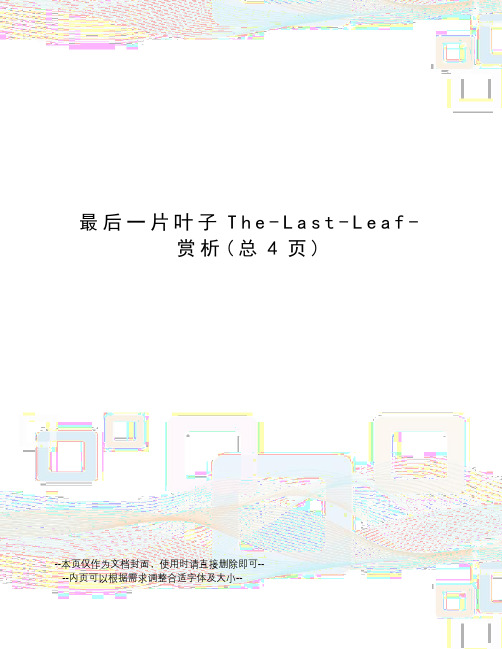
最后一片叶子T h e-L a s t-L e a f-赏析(总4页)--本页仅作为文档封面,使用时请直接删除即可----内页可以根据需求调整合适字体及大小--最后一片叶子The Last Leaf 赏析【摘要】美国著名短篇小说家欧·亨利《最后一片叶子》描写了一个已经濒于死亡的贫穷女画家乔安西因为一片永不凋落的常春藤叶而恢复健康的离奇故事,塑造了一个命运不济,但品德高尚的老画家贝尔门的形象,歌颂了他舍己为人的崇高精神,从而唱出了一曲生命与希望的赞歌,歌颂了人性的美与善。
《最后一片叶子》作为欧·亨利的代表作,充分体现了这位“世界短篇小说之王”的创作特色。
文中作者着力挖掘和赞美小人物的伟大人格和高尚品德,展示他们向往人性世界的美好愿望The Novel "The Last Leaf" is about a young girl decidesthat she will die when the last leaf drops from a dying vine outside her window, as lingering pneumonia slowly takes her will to live. Her neighbor, Art Carney, is an elderly artist frustrated by his inability to paint what is in his heart. In an attempt to save the young girl, he creates the masterpiece he has been struggling to paint. A beautifully shot and moving story. This excellent short novel is my favorite story. Art Carney does a great job, although his character is French in this version, as opposed to the German character in the book. and just like the book,it truly touched the heart of its reader.【关键词】生命;希望;赞歌;一、希望的使者“当最后一片叶子落下时,生命就都结束了,我也得离开这个世界而去了”,女画家乔安西,患了肺炎濒临大限时,丧失了生的希望,她天天躺在床上望着窗外长春藤上的叶子想:等到最后一片叶子凋零时,我的生命也就走到了尽头。
【英文原版小说】欧·亨利短篇小说-TheLastLeaf最后一片叶子

The Last Leaf最后一片叶子IIn a little district west of Washington Square the streets have run crazy and broken themselves into small strips called "places." These "places" make strange angles and curves. One Street crosses itself a time or two. An artist once discovered a valuable possibility in this street. Suppose a collector with a bill for paints, paper and canvas should, in traversing this route, suddenly meet himself coming back, without a cent having been paid on account!So, to quaint old Greenwich Village the art people soon came prowling, hunting for north windows and eighteenth-century gables and Dutch attics and low rents. Then they imported some pewter mugs and a chafing dish or two from Sixth Avenue, and became a "colony."At the top of a squatty, three-story brick Sue and Johnsy had their studio. "Johnsy" was familiar for Joanna. One was from Maine; the other from California. They had met at the table d'h?te of an Eighth Street "Delmonico's," and found their tastes in art, chicory salad and bishop sleeves so congenial that the joint studio resulted.That was in May. In November a cold, unseen stranger, whom the doctors called Pneumonia, stalked about the colony, touching one here and there with his icy fingers.Over on the east side this ravager strode boldly, smiting his victims by scores, but his feet trod slowly through the maze of the narrow and moss-grown "places."Mr. Pneumonia was not what you would call a chivalric old gentleman. A mite of a little woman with blood thinned by California zephyrs was hardly fair game for the red-fisted, short-breathed old duffer. But Johnsy he smote; and she lay, scarcely moving, on her painted iron bedstead, looking through the small Dutch window-panes at the blank side of the next brick house.One morning the busy doctor invited Sue into the hallway with a shaggy, grey eyebrow."She has one chance in - let us say, ten," he said, as he shook down the mercury in his clinical thermometer. " And that chance is for her to want to live. This way people have of lining-u on the side of the undertaker makes the entire pharmacopoeia look silly. Your little lady has made up her mind that she's not going to get well.Has she anything on her mind?""She - she wanted to paint the Bay of Naples some day." said Sue."Paint? - bosh! Has she anything on her mind worth thinking twice - a man for instance?""A man?" said Sue, with a jew's-harp twang in her voice. "Is a man worth - but, no, doctor; there is nothing of the kind.""Well, it is the weakness, then," said the doctor. "I will do all that science, so far as it may filter through my efforts, can accomplish. But whenever my patient begins to count the carriages in her funeral procession I subtract 50 per cent from the curative power of medicines. If you will get her to ask one question about the new winter styles in cloak sleeves I will promise you a one-in-five chance for her, instead of one in ten."After the doctor had gone Sue went into the workroom and cried a Japanese napkin to a pulp. Then she swaggered into Johnsy's room with her drawing board, whistling ragtime.Johnsy lay, scarcely making a ripple under the bedclothes, with her face toward the window. Sue stopped whistling, thinking she was asleep.She arranged her board and began a pen-and-ink drawing to illustrate a magazine story. Young artists must pave their way to Art by drawing pictures for magazine stories that young authors write to pave their way to Literature.As Sue was sketching a pair of elegant horseshow riding trousers and a monocle of the figure of the hero, an Idaho cowboy, she heard a low sound, several times repeated. She went quickly to the bedside.Johnsy's eyes were open wide. She was looking out the window and counting - counting backward."Twelve," she said, and little later "eleven"; and then "ten," and "nine"; and then "eight" and "seven", almost together.Sue look solicitously out of the window. What was there to count? There was only a bare, dreary yard to be seen, and the blank side of the brick house twenty feet away.An old, old ivy vine, gnarled and decayed at the roots, climbed half way up the brick wall. The cold breath of autumn had stricken its leaves from the vine until its skeleton branches clung, almost bare, to the crumbling bricks."What is it, dear?" asked Sue."Six," said Johnsy, in almost a whisper. "They're falling faster now. Three days ago there were almost a hundred. It made my head ache to count them. But now it's easy.There goes another one. There are only five left now.""Five what, dear? Tell your Sudie.""Leaves. On the ivy vine. When the last one falls I must go, too. I've known that for three days. Didn't the doctor tell you?""Oh, I never heard of such nonsense," complained Sue, with magnificent scorn. "What have old ivy leaves to do with your getting well? And you used to love that vine so, you naughty girl. Don't be a goosey. Why, the doctor told me this morning that your chances for getting well real soon were - let's see exactly what he said - he said the chances were ten to one! Why, that's almost as good a chance as we have in New York when we ride on the street cars or walk past a new building. Try to take some broth now, and let Sudie go back to her drawing, so she can sell the editor man with it, and buy port wine for her sick child, and pork chops for her greedy self." "You needn't get any more wine," said Johnsy, keeping her eyes fixed out the window. "There goes another. No, I don't want any broth. That leaves just four. I want to see the last one fall before it gets dark. Then I'll go, too.""Johnsy, dear," said Sue, bending over her, "will you promise me to keep your eyes closed, and not look out the window until I am done working? I must hand those drawings in by to-morrow. I need the light, or I would draw the shade down.""Couldn't you draw in the other room?" asked Johnsy, coldly."I'd rather be here by you," said Sue. "Beside, I don't want you to keep looking at those silly ivy leaves.""Tell me as soon as you have finished," said Johnsy, closing her eyes, and lying white and still as fallen statue, "because I want to see the last one fall. I'm tired of waiting. I'm tired of thinking. I want to turn loose my hold on everything, and go sailing down, down, just like one of those poor, tired leaves.""Try to sleep," said Sue. "I must call Behrman up to be my model for the old hermit miner. I'll not be gone a minute. Don't try to move 'til I come back."Old Behrman was a painter who lived on the ground floor beneath them. He was past sixty and had a Michael Angelo's Moses beard curling down from the head of a satyr along with the body of an imp. Behrman was a failure in art. Forty years he had wielded the brush without getting near enough to touch the hem of his Mistress's robe.He had been always about to paint a masterpiece, but had never yet begun it. For several years he had painted nothing except now and then a daub in the line of commerce or advertising. He earned a little by serving as a model to those young artists in the colony who could not pay the price of a professional. He drank gin to excess, and still talked of his coming masterpiece. For the rest he was a fierce little old man, who scoffed terribly at softness in any one, and who regarded himself as especial mastiff-in-waiting to protect the two young artists in the studio above.Sue found Behrman smelling strongly of juniper berries in his dimly lighted den below. In one corner was a blank canvas on an easel that had been waiting there for twenty-five years to receive the first line of the masterpiece. She told him of Johnsy's fancy, and how she feared she would, indeed, light and fragile as a leaf herself, float away, when her slight hold upon the world grew weaker.Old Behrman, with his red eyes plainly streaming, shouted his contempt and derision for such idiotic imaginings."Vass!" he cried. "Is dere people in de world mit der foolishness to die because leafs dey drop off from a confounded vine? I haf not heard of such a thing. No, I will not bose as a model for your fool hermit-dunderhead. Vy do you allow dot silly pusiness to come in der brain of her? Ach, dot poor leetle Miss Yohnsy.""She is very ill and weak," said Sue, "and the fever has left her mind morbid and full of strange fancies. Very well, Mr. Behrman, if you do not care to pose for me, you needn't. But I think you are a horrid old - old flibbertigibbet.""You are just like a woman!" yelled Behrman. "Who said I will not bose? Go on. I come mit you. For half an hour I haf peen trying to say dot I am ready to bose. Gott! dis is not any blace in which one so goot as Miss Yohnsy shall lie sick. Some day I vill baint a masterpiece, and ve shall all go away. Gott! yes."Johnsy was sleeping when they went upstairs. Sue pulled the shade down to the window-sill, and motioned Behrman into the other room. In there they peered out the window fearfully at the ivy vine. Then they looked at each other for a moment without speaking. A persistent, cold rain was falling, mingled with snow. Behrman, in his old blue shirt, took his seat as the hermit miner on an upturned kettle for a rock.When Sue awoke from an hour's sleep the next morning she found Johnsy with dull, wide-open eyes staring at the drawn green shade."Pull it up; I want to see," she ordered, in a whisper.Wearily Sue obeyed.But, lo! after the beating rain and fierce gusts of wind that had endured through the livelong night, there yet stood out against the brick wall one ivy leaf. It was the last one on the vine. Still dark green near its stem, with its serrated edges tinted with the yellow of dissolution and decay, it hung bravely from the branch some twenty feet above the ground."It is the last one," said Johnsy. "I thought it would surely fall during the night. I heard the wind. It will fall to-day, and I shall die at the same time.""Dear, dear!" said Sue, leaning her worn face down to the pillow, "think of me, if you won't think of yourself. What would I do?"But Johnsy did not answer. The lonesomest thing in all the world is a soul when it is making ready to go on its mysterious, far journey. The fancy seemed to possess her more strongly as one by one the ties that bound her to friendship and to earth were loosed.The day wore away, and even through the twilight they could see the lone ivy leaf clinging to itsstem against the wall. And then, with the coming of the night the north wind was again loosed, while the rain still beat against the windows and pattered down from the low Dutch eaves. When it was light enough Johnsy, the merciless, commanded that the shade be raised.The ivy leaf was still there.Johnsy lay for a long time looking at it. And then she called to Sue, who was stirring her chicken broth over the gas stove."I've been a bad girl, Sudie," said Johnsy. "Something has made that last leaf stay there to show me how wicked I was. It is a sin to want to die. You may bring a me a little broth now, and some milk with a little port in it, and - no; bring me a hand-mirror first, and then pack some pillows about me, and I will sit up and watch you cook."And hour later she said:"Sudie, some day I hope to paint the Bay of Naples."The doctor came in the afternoon, and Sue had an excuse to go into the hallway as he left. "Even chances," said the doctor, taking Sue's thin, shaking hand in his. "With good nursing you'll win." And now I must see another case I have downstairs. Behrman, his name is - some kind of an artist, I believe. Pneumonia, too. He is an old, weak man, and the attack is acute. There is no hope for him; but he goes to the hospital to-day to be made more comfortable."The next day the doctor said to Sue: "She's out of danger. You won. Nutrition and care now - that's all."And that afternoon Sue came to the bed where Johnsy lay, contentedly knitting a very blue and very useless woollen shoulder scarf, and put one arm around her, pillows and all."I have something to tell you, white mouse," she said. "Mr. Behrman died of pneumonia to-day in the hospital. He was ill only two days. The janitor found him the morning of the first day in his room downstairs helpless with pain. His shoes and clothing were wet through and icy cold. They couldn't imagine where he had been on such a dreadful night. And then they found a lantern, still lighted, and a ladder that had been dragged from its place, and some scattered brushes, and a palette with green and yellow colours mixed on it, and - look out the window, dear, at the last ivy leaf on the wall. Didn't you wonder why it never fluttered or moved when the wind blew? Ah, darling, it's Behrman's masterpiece - he painted it there the night that the last leaf fell."在华盛顿广场西边的一个小区里,街道都横七竖八地伸展开去,又分裂成一小条一小条的“胡同”。
最后一片叶子剧本the last leaf
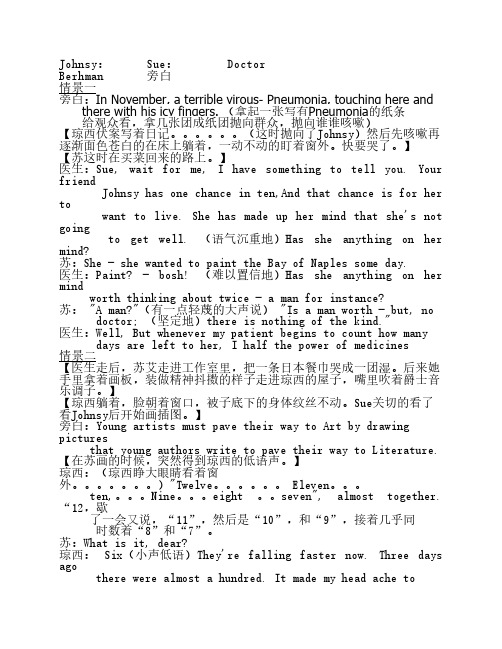
Johnsy: Sue: DoctorBerhman 旁白情景一旁白:In November, a terrible virous- Pneumonia, touching here and there with his icy fingers. (拿起一张写有Pneumonia的纸条给观众看,拿几张团成纸团抛向群众,抛向谁谁咳嗽)【琼西伏案写着日记。
(这时抛向了Johnsy)然后先咳嗽再逐渐面色苍白的在床上躺着,一动不动的盯着窗外。
快要哭了。
】【苏这时在买菜回来的路上。
】医生:Sue, wait for me, I have something to tell you. Your friendJohnsy has one chance in ten,And that chance is for her towant to live. She has made up her mind that she's not goingto get well. (语气沉重地)Has she anything on her mind?苏:She - she wanted to paint the Bay of Naples some day.医生:Paint? - bosh! (难以置信地)Has she anything on her mindworth thinking about twice - a man for instance?苏: "A man?"(有一点轻蔑的大声说) "Is a man worth - but, nodoctor; (坚定地)there is nothing of the kind."医生:Well, But whenever my patient begins to count how manydays are left to her, I half the power of medicines情景二【医生走后,苏艾走进工作室里,把一条日本餐巾哭成一团湿。
最后一片叶子The-Last-Leaf-赏析
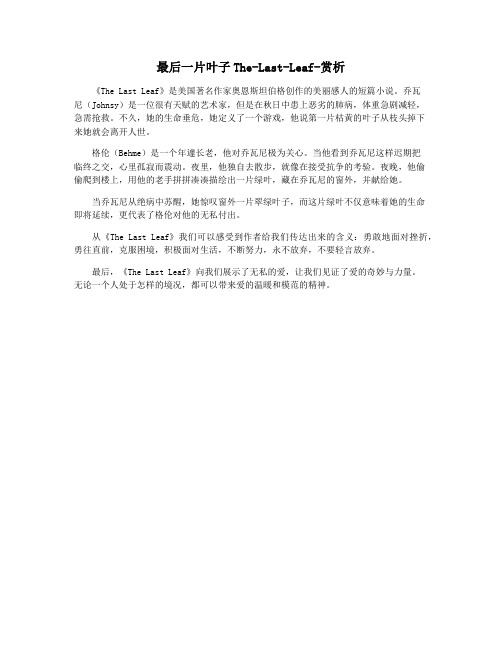
最后一片叶子The-Last-Leaf-赏析
《The Last Leaf》是美国著名作家奥恩斯坦伯格创作的美丽感人的短篇小说。
乔瓦
尼(Johnsy)是一位很有天赋的艺术家,但是在秋日中患上恶劣的肺病,体重急剧减轻,
急需抢救。
不久,她的生命垂危,她定义了一个游戏,他说第一片枯黄的叶子从枝头掉下
来她就会离开人世。
格伦(Behme)是一个年遽长老,他对乔瓦尼极为关心。
当他看到乔瓦尼这样迟期把
临终之交,心里孤寂而震动。
夜里,他独自去散步,就像在接受抗争的考验。
夜晚,他偷
偷爬到楼上,用他的老手拼拼凑凑描绘出一片绿叶,藏在乔瓦尼的窗外,并献给她。
当乔瓦尼从绝病中苏醒,她惊叹窗外一片翠绿叶子,而这片绿叶不仅意味着她的生命
即将延续,更代表了格伦对他的无私付出。
从《The Last Leaf》我们可以感受到作者给我们传达出来的含义:勇敢地面对挫折,勇往直前,克服困境,积极面对生活,不断努力,永不放弃,不要轻言放弃。
最后,《The Last Leaf》向我们展示了无私的爱,让我们见证了爱的奇妙与力量。
无论一个人处于怎样的境况,都可以带来爱的温暖和模范的精神。
最后一片叶子(中英对照)
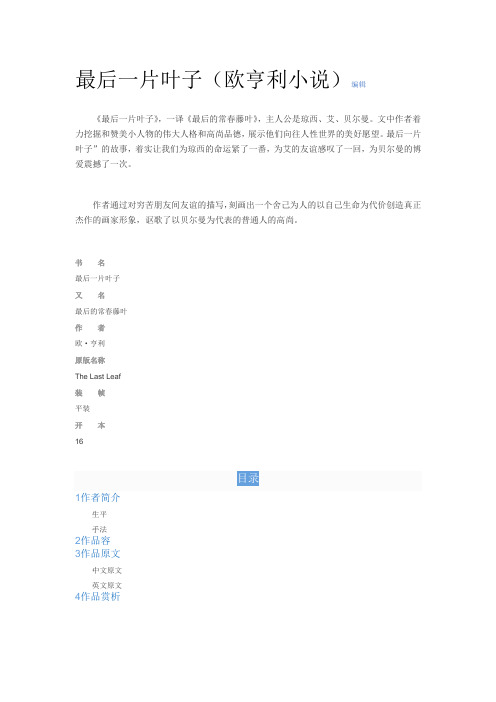
最后一片叶子(欧亨利小说)编辑《最后一片叶子》,一译《最后的常春藤叶》,主人公是琼西、艾、贝尔曼。
文中作者着力挖掘和赞美小人物的伟大人格和高尚品德,展示他们向往人性世界的美好愿望。
最后一片叶子”的故事,着实让我们为琼西的命运紧了一番,为艾的友谊感叹了一回,为贝尔曼的博爱震撼了一次。
作者通过对穷苦朋友间友谊的描写,刻画出一个舍己为人的以自己生命为代价创造真正杰作的画家形象,讴歌了以贝尔曼为代表的普通人的高尚。
书名最后一片叶子又名最后的常春藤叶作者欧·亨利原版名称The Last Leaf装帧平装开本161作者简介▪生平▪手法2作品容3作品原文▪中文原文▪英文原文4作品赏析1作者简介编辑生平1862年9月11日,美国最著名的短篇小说家之——欧·亨利(O.Henry)出生于美国北卡罗来纳州有个名叫格林斯波罗的小镇。
曾被评论界誉为曼哈顿桂冠散文作家和美国现代短篇小说之父。
1862年他出身于美国北卡罗来纳州格林斯波罗镇一个医师家庭。
父亲是医生。
他原名威廉·西德尼·波特(William Sydney Porter)。
他所受教育不多,15岁便开始在药房当学徒,20岁时由于健康原因去德克萨斯州的一个牧场当了两年牧牛人,积累了对西部生活的亲身经验。
1884年以后做过会计员、土地局办事员、新闻记者。
此后,他在德克萨斯做过不同的工作,包括在奥斯汀银行当出纳员。
他还办过一份名为《滚石》的幽默周刊,并在休斯敦一家日报上发表幽默小说和趣闻逸事。
1887年,亨利结婚并生了一个女儿。
正当他的生活颇为安定之时,却发生了一件改变他命运的事情。
1896年,奥斯汀银行指控他在任职期间盗用资金。
他为了躲避受审,逃往洪都拉斯。
1897年,后因回家探视病危的妻子被捕入狱,判处5年徒刑。
在狱中曾担任药剂师,他创作第一部作品的起因是为了给女儿买圣诞礼物,但基于犯人的身份不敢使用真名,乃用一部法国药典的编者的名字作为笔名,在《麦克吕尔》杂志发表。
最后一片叶子英语作文100字
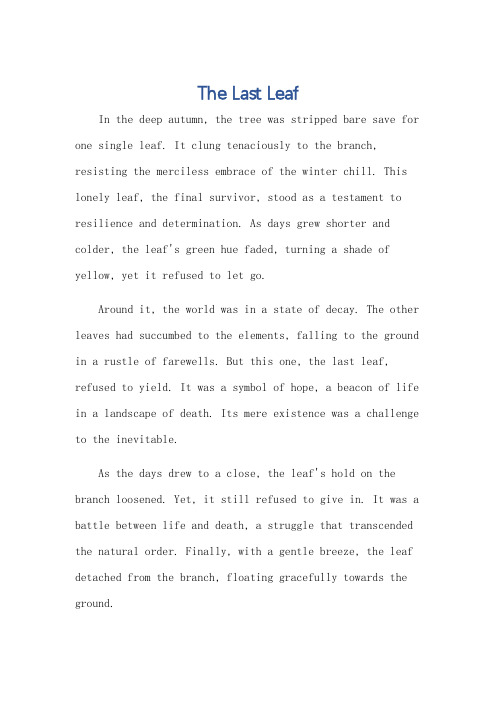
The Last LeafIn the deep autumn, the tree was stripped bare save for one single leaf. It clung tenaciously to the branch, resisting the merciless embrace of the winter chill. This lonely leaf, the final survivor, stood as a testament to resilience and determination. As days grew shorter and colder, the leaf's green hue faded, turning a shade of yellow, yet it refused to let go.Around it, the world was in a state of decay. The other leaves had succumbed to the elements, falling to the ground in a rustle of farewells. But this one, the last leaf, refused to yield. It was a symbol of hope, a beacon of life in a landscape of death. Its mere existence was a challenge to the inevitable.As the days drew to a close, the leaf's hold on the branch loosened. Yet, it still refused to give in. It was a battle between life and death, a struggle that transcended the natural order. Finally, with a gentle breeze, the leaf detached from the branch, floating gracefully towards the ground.Its fall was not a defeat, but a victory. It had defied the odds, held on longer than any other. Its legacy was not just in the tree it had once adorned, but in the spirit it had inspired. The last leaf taught us that even in the face of adversity, resilience and hope can prevail.**最后一片叶子**深秋时节,树上只剩下最后一片叶子。
欧亨利《最后一片叶子》(又名《最后的常春藤叶》)课件PPT(35页)
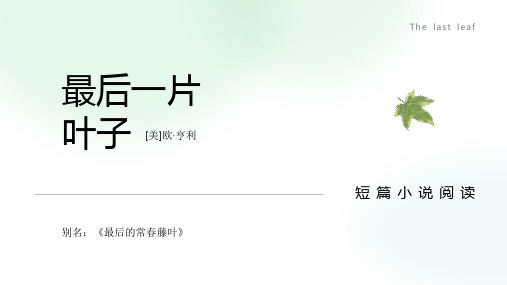
整体感知
故事发生在什么地方?
故事发生在华盛顿广场西边的 一个胡同区里。
整体感知
作者围绕最后一片叶子写了哪些人物? 哪些是主要人物?
作者所写的人物: 苏、琼西、贝尔曼、医生。 主要人物: 苏、琼西、贝尔曼。
整体感知
“最后一片叶子” 在全文起什么作用?
答:“最后一片叶子”起到了贯穿文章故事情节的作用, 连接了琼西由病重到好转、贝尔曼去世的事件。
侧面—— 通过医生和苏的对话间接写贝尔曼。贝尔曼为了 挽救琼西的生命,冒雨画最后一片叶子,得了肺 炎去世。他是一个有自我牺牲的精神的人。
内 容 探 究
总结:贝尔曼在他平凡甚至 有点讨厌的外表下,藏着一 颗火热的爱心,虽然穷困潦 倒,却默默关心、帮助他人, 甚至不惜付出生命的代价。
NEIRONGTANJIU
创作背景
《最后一片叶子》的故事的场景是纽约市的 格林尼治艺术家聚居区。百年来,那里已然从身 处窘境的文人聚居区发展为举世闻名的艺术中心 和旅游胜地。因此,从欧·亨利的创作时代即可 获得主人公的生存状况,他们是许多未成名艺术 家的代表,他们梦想着改变现状。
The last leaf
文章体裁
小
Fiction
说
• 小说是以塑造人物形象为中心,通过故事情节叙述和 环境描写反映社会生活的一种文学体裁。
• 人物形象、故事情节、环境是小说的三要素。
• 其中,人物是最主要的要素。人物是小说的核心,情节是 骨GANZHI
生字词
bǐ bó
鄙薄
wēn
瘟神
miè
轻蔑
xǔ
自诩
dònɡ tɑn
NEIRONGTANJIU
内
容
2.在琼西命悬一线的情况下,苏是如何照顾她的?
最后一片叶子(中英对照)

最后一片叶子(欧亨利小说)编纂之马矢奏春创作《最后一片叶子》, 一译《最后的常春藤叶》, 主人公是琼西、苏艾、贝尔曼.文中作者着力挖掘和赞美小人物的伟年夜人格和高尚品德, 展示他们向往人性世界的美好愿望.最后一片叶子”的故事, 着实让我们为琼西的命运紧张了一番, 为苏艾的友谊感叹了一回, 为贝尔曼的泛爱震撼了一次.作者通过对穷苦朋友间友谊的描写, 刻画出一个舍己为人的以自己生命为价格缔造真正杰作的画家形象, 讴歌了以贝尔曼为代表的普通人的高尚.书名最后一片叶子又名最后的常春藤叶作者欧·亨利原版名称The Last Leaf装帧平装开本161作者简介▪生平▪手法2作品内容3作品原文▪中文原文▪英文原文4作品赏析作者简介编纂生平1862年9月11日, 美国最著名的短篇小说家之——欧·亨利(O.Henry)出身于美国北卡罗来纳州有个名叫格林斯波罗的小镇.曾被评论界誉为曼哈顿桂冠散文作家和美国现代短篇小说之父.1862年他出身于美国北卡罗来纳州格林斯波罗镇一个医师家庭.父亲是医生.他原名威廉·西德尼·波特(William Sydney Porter).他所受教育未几, 15岁便开始在药房当学徒, 20岁时由于健康原因去德克萨斯州的一个牧场当了两年牧牛人, 积累了对西部生活的亲身经验.1884年以后做过会计员、土地局处事员、新闻记者.尔后, 他在德克萨斯做过分歧的工作, 包括在奥斯汀银行当出纳员.他还办过一份名为《滚石》的幽默周刊, 并在休斯敦一家日报上发表幽默小说和趣闻逸事.1887年, 亨利结婚并生了一个女儿. 正当他的生活颇为安宁之时, 却发生了一件改变他命运的事情.1896年, 奥斯汀银行指控他在任职期间盗用资金.他为了遁藏受审, 逃往洪都拉斯.1897年, 后因回家探视病危的妻子被捕入狱, 判处5年徒刑.在狱中曾担负药剂师, 他创作第一部作品的起因是为了给女儿买圣诞礼物, 但基于犯人的身份不敢使用真名, 乃用一部法国药典的编者的名字作为笔名, 在《麦克吕尔》杂志发表.1901年, 因“行为良好”提前获释, 来到纽约专事写作. 正当他的创作力最旺盛的时候, 健康状况却开始恶化, 于1910年病逝.欧·亨利在年夜概十年的时间内创作了短篇小说共有300多篇, 收入《白菜与国王》(1904)[其唯一一部长篇, 作者通过四五条并行的线索, 试图描绘出一幅广阔的画面, 在写法上有它的新颖之处.不外从另一方面看, 小说章与章之间的内在联系不够紧密, 各有自力的内容]、《四百万》(1906)、《西部之心》(1907)、《市声》(1908)、《滚石》(1913)等集子, 其中以描写纽约曼哈顿市民生活的作品为最著名.他把那儿的街道、小饭馆、破旧的公寓的气氛渲染得十分逼真, 故有“曼哈顿的桂冠诗人”之称.他曾以骗子的生活为题材, 写了很多短篇小说.作者企图标明不苟言笑的上流社会里, 有很多人就是高级的骗子, 胜利的骗子.欧·亨利对社会与人生的观察和分析其实不深刻, 有些作品比力浅薄, 但他一生困顿, 常与失意落魄的小人物同甘共苦, 又能以别具一格的艺术手法暗示他们复杂的感情.他的作品构思新颖, 语言诙谐, 结局经常出人意外;又因描写了众多的人物, 富于生活情趣, 被誉为“美国生活的幽默百科全书”.因此, 他最超卓的短篇小说如《爱的牺牲》(A Service of Love)、《警察与赞美诗》(The Cop and the Anthem)、《带家具出租的房间》(The Furnished Room)、《麦琪的礼物》(The Gift of the Magi)、《最后的常春藤叶》(The Last Leaf)等都可列入世界优秀短篇小说之中.他的文字生动活泼, 善于利用双关语、讹音、谐音和旧典新意, 妙趣横生,被喻为[含泪的微笑].他还以准确的细节描写, 制造与再现气氛, 特别是年夜城市夜生活的气氛.手法欧·亨利还以擅长结尾闻名遐迩, 美国文学界称之为“欧·亨利式的结尾”他善于戏剧性地设计情节, 埋下伏笔, 作好铺垫, 勾勒矛盾, 最后在结尾处突然让人物的心理情境发生出其不意的变动, 或使主人公命运陡然逆转, 使读者感到豁然开朗, 柳暗花明, 既在意料之外, 又在情理之中, 不由拍案称奇, 从而造成共同的艺术魅力.有一种被称为“含泪的微笑”的共同艺术风格.欧·亨利把小说的灵魂全都凝聚在结尾部份, 让读者在前的似乎是平淡无奇的而又是诙谐风趣的娓娓动人的描述中, 不知不觉地进入作者精心设置的迷宫, 直到最后, 忽如电光一闪, 才照亮了先前隐藏着的一切, 仿佛在和读者捉迷藏, 或者在玩弄障眼法, 给读者最后一个惊喜.在欧·亨利之前, 其他短篇小说家也已经这样检验考试过这种出其不意的结局.可是欧·亨利对此运用得更为经常, 更为自然, 也更为熟练老到.作品内容编纂穷画家琼珊得了重病,在病房里看着窗外对面树上的常春藤叶子不竭被风吹落, 她认为最后一片叶子的凋零代表自己的死亡, 于是她失去了生存的意志.医生认为再这样下去琼珊会死去.贝尔曼, 一个伟年夜的画家, 在听完苏艾讲述室友琼珊的事情后, 夜里冒着暴雨, 用心灵的画笔画出了一片“永不凋零”的常春藤叶, 让琼珊重拾对生命的希望,而自己却因此患上肺炎, 去世了.作品原文编纂中文原文在华盛顿广场西面的一个小区里, 街道仿佛发了狂似的分成了许多叫做“巷子”的小胡同.这些“巷子”形成许多奇特的角度和曲线.一条街有时自己自己就交叉了不止一次.有一回一个画家发现这条街有他的可贵之处.如果一个商人去收颜料、纸张和画布的账款, 在这条街上转弯抹角、年夜兜圈子的时候, 突然碰到一毛钱也没收到、空手而归的自己, 那才有意思呢!所以, 不久之后很多画家就摸索到这个古色古香的老格林尼治村来了.他们逛来逛去, 寻求朝北的窗户、18世纪的三角墙、荷兰式的阁楼, 以及昂贵的房租.然后, 他们又从第六街买来一些锡蜡杯子和一两只烘锅, 组成了一个“艺术区”.苏艾和琼珊在一座矮墩墩的的三层楼砖屋的顶楼设立了她们的画室.“琼珊”是琼西的昵称.她俩一个来自缅因州, 一个是加利福尼亚州人.她们是在德尔蒙戈饭馆吃客饭时碰到的, 彼此一谈, 发现她们对艺术、饮食、衣着的口味十分相投, 结果便联合租下了那间画室.那是5月里的事.到了11月, 一个冷酷的、肉眼看不见的、医生们叫做“肺炎”的不速之客, 在艺术区里悄悄地游荡, 用他冰凉的手指头这里碰一下那里碰一下.在广场东头, 这个破坏者明目张胆地踏着年夜步, 一下子就击倒几十个受害者, 可是在迷宫一样、狭窄而铺满青的“胡同”里, 他的法式就慢了下来.肺炎先生不是一个你们心目中行侠仗义的老绅士.一个身子薄弱, 被加利福尼亚州的西风刮得没有血色的弱女子, 原本不应该是这个有着红拳头的、呼吸急促的老家伙冲击的对象.然而, 琼西却遭到了冲击;她躺在一张油漆过的铁床上, 一动也不动, 凝望着小小的荷兰式玻璃窗外对面砖房的空墙.一天早晨, 那个忙碌的医生扬了扬他那毛茸茸的灰白色眉毛, 把苏叫到外边的走廊上.“我看, 她的病只有一成希望, ”他说, 一面把体温内外的水银甩下去, “这一成希望在于她自己要不要活下去.人们不想活, 情愿照顾殡仪馆的生意, 这种精神状态使医药一筹莫展.你的这位小姐满肚子以为自己不会好了.她有什么心事吗?”“她——她希望有一天能够去画那不勒斯海湾.”苏艾说.“绘画?——别瞎扯了!她心里有没有值得想两次的事情.比如说, [1]男人?”“男人?”苏艾像吹口琴似的扯着嗓子说, “男人难道值得... ...不, 医生, 没有这样的事.”“能到达的全部力量去治疗她.可要是我的病人开始算计会有几多辆马车送她出丧, 我就得把治疗的效果减失落百分之五十.只要你能想法让她对夏季年夜衣袖子的时新式样感到兴趣而提出一两个问题, 那我可以向你保证把医好她的机会从十分之一提高到五分之一.”医生走后, 苏艾走进工作室里, 把一条日本餐巾哭成一团湿.后来她手里拿着画板, 装做精神奋起的样子走进琼西的屋子, 嘴里吹着爵士音乐调子.琼西躺着, 脸朝着窗口, 被子底下的身体纹丝不动.苏以为她睡着了, 赶忙停止吹口哨.她架好画板, 开始给杂志里的故事画一张钢笔插图.年轻的画家为了铺平通向艺术的路途, 不能不给杂志里的故事画插图, 而这些故事又是年轻的作家为了铺平通向文学的路途而不能不写的.苏艾正在给故事主人公, 一个爱达荷州牧人的身上, 画上一条马匹展览会穿的时髦马裤和一片单眼镜时, 忽然听到一个重复了几次的卑微的声音.她快步走到床边.琼珊的眼睛睁得很年夜.她望着窗外, 数着……倒过来数.“12, ”她数道, 歇了一会又说, “11”, 然后是“10”, 和“9”, 接着几乎同时数着“8”和“7”.苏艾关切地看了看窗外.那儿有什么可数的呢?只见一个空荡阴暗的院子, 20英尺以外还有一所砖房的空墙.一棵老极了的常春藤, 枯萎的根纠结在一块, 枝干攀在砖墙的半腰上.秋天的寒风把藤上的叶子差未几全都吹失落了, 几乎只有光秃的枝条还缠附在剥落的砖块上.“什么, 亲爱的?”苏问道.“6, ”琼西几乎用耳语低声说道, “它们现在越落越快了.三天前还有差未几一百片.我数得头都疼了.可是现在好数了.又失落了一片.只剩下五片了.”“五片什么, 亲爱的.告诉你的苏艾.”“叶子.常春藤上的.比及最后一片叶子失落下来, 我也就该去了.这件事我三天前就知道了.难道医生没有告诉你?”“哟, 我历来没听过这么荒唐的话, ”苏艾满不在乎地说, “那些破常春藤叶子同你的病有什么相干?你以前不是很喜欢这棵树吗?得啦, 你这个淘气的姑娘.不要说傻话了.瞧, 医生今天早晨还告诉我, 说你迅速痊愈的机会是, 让我想想他是怎么说的---他说你好的几率有十比一!噢, 那简直和我们在纽约坐电车或者走过一座新楼房的掌控一样年夜.喝点汤吧, 让苏艾去画她的画, 好把它卖给编纂先生, 换了钱来给她的病孩子买点红葡萄酒, 再买些猪排给自己解解馋.”“你不用买酒了, ”琼珊的眼睛直盯着窗外说道, “又落了一片.不, 我不想喝汤.只剩下四片了.我想在天黑以前等着看那最后一片叶子失落下去.然后我也要去了.”“琼珊, 亲爱的, ”苏艾俯着身子对她说, “等我画完行吗?明天我一定得交出这些插图.我需要光线, 否则我就拉下窗帘了.”“你就不能到另一间屋子里去画吗?”琼西冷冷地问道.“我要在这儿陪你, 和你在一起, ”苏艾说, “再说, 我不喜欢你老是盯着那些叶子看.”“你一画完就叫我, ”琼珊说着, 便闭上了眼睛.她脸色苍白, 一动不动地躺在床上, 就像是座横倒在地上的雕像.“因为我想看那最后一片叶子失落下来, 我等得不耐烦了, 也想得不耐烦了.我想解脱一切, 飘下去, 飘下去, 像一片可怜的疲倦了的叶子那样.”“你争取睡一会儿, ”苏艾说道, “我得下楼把贝尔曼叫上来, 给我当那个隐居的老矿工的模特儿.我一会儿就会回来的.你不要动, 等我回来.”老贝尔曼是住在她们这座楼房底层的一个画家.他年过60, 有一把像米开朗琪罗的摩西雕像那样的年夜胡子, 这胡子长在一个像半人半兽的森林之神的头颅上, 又鬈曲地飘拂在小鬼似的身躯上.贝尔曼是个失败的画家.他操了四十年的画笔, 还远没有摸着艺术女神的衣裙.他老是说就要画他的那幅杰作了, 可是直到现在他还没有动笔.几年来, 他除偶尔画点商业广告之类的玩意儿以外, 什么也没有画过.他给艺术区里穷得雇不起职业模特儿的年轻画家们当模特儿, 挣一点钱.他喝酒毫无节制, 还时常提起他要画的那幅杰作.除此以外, 他是一个火气十足的小老头子, 十分瞧不起他人的温情, 却认为自己是专门呵护楼上画室里那两个年轻女画家的一只看家犬.苏艾在楼下他那间光线昏暗的小房里找到了贝尔曼, 满嘴酒气扑鼻.一幅空白的画布绷在个画架上, 摆在屋角里, 等候那幅杰作已经25年了, 可是连一根线条都还没等着.苏艾把琼珊的胡思乱想告诉了他, 还说她害怕琼珊自个儿瘦小柔弱得像一片叶子一样, 对这个世界的留恋越来越微弱, 恐怕真会离世飘走了.老贝尔曼两只发红的眼睛显然在迎风流泪, 他十分轻蔑地嗤笑这种傻呆的胡思乱想.“什么, ”他喊道, “世界上竟会有人蠢到因为那些该死的常春藤叶子落失落就想死?我历来没有听说过这种怪事.不, 我才没功夫给你那隐居的矿工糊涂虫当模特儿呢.你怎么可以让她胡思乱想?唉, 可怜的琼珊小姐.”“她病得很厉害很虚弱, ”苏艾说, “发高烧发得她神经昏乱, 满脑子都是古怪想法.好吧, 贝尔曼先生, 你不愿意给我当模特儿就算了, 我看你是个讨厌的老... ...老啰唆鬼.”“你简直太婆婆妈妈了!”贝尔曼喊道, “谁说我不愿意当模特儿?走, 我和你一块去.我不是讲了半天愿意给你当模特儿吗?老天爷, 像琼珊小姐这么好的姑娘真不应该躺在这种处所生病.总有一天我要画一幅杰作, 那时我们就可以都搬出去了.““一定的!”他们上楼以后, 琼珊正睡着觉.苏艾把窗帘拉下, 一直遮住窗台, 做手势叫贝尔曼到隔壁屋子里去.他们在那里提心吊胆地瞅着窗外那棵常春藤.后来他们默默无言, 彼此对望了一会.寒冷的雨夹杂着雪花不竭地下着.贝尔曼穿戴他的旧蓝衬衣, 坐在一把翻过来充任岩石的铁壶上, 扮作隐居的矿工.第二天早晨, 苏艾只睡了一个小时的觉, 醒来了, 她看见琼珊无神的眼睛睁得年夜年夜地注视拉下的绿窗帘.“把窗帘拉起来, 我要看看.”她低声地命令道.苏艾疲倦地照办了.然而, 看呀!经过了漫长一夜的风吹雨打, 在砖墙上还挂着一片藤叶.它是常春藤上最后的一片叶子了.靠近茎部仍然是深绿色, 可是锯齿形的叶子边缘已经枯萎发黄, 它傲然挂在一根离地二十多英尺的藤枝上.“这是最后一片叶子.”琼珊说道, “我以为它昨晚一定会落失落的.我听见风声了.今天它一定会落失落, 我也会死的.”“哎呀, 哎呀, ”苏艾把疲乏的脸庞靠近枕头边上对她说, “你不愿为自己着想, 也得为我想想啊.我可怎么办呢?”可是琼珊不回答.当一个灵魂正在准备走上那神秘的、遥远的死亡之途时, 她是世界上最寂寞的人了.那些把她和友谊极年夜地联结起来的关系逐渐消失以后, 她那个狂想越来越强烈了.白天总算过去了, 甚至在暮色中她们还能看见那片孤零零的藤叶仍紧紧地依附在靠墙的枝上.后来, 夜的来临带来呼啸的北风,雨点不竭地拍打着窗子, 雨水从高扬的荷兰式屋檐上流泻下来.天刚蒙蒙亮, 琼珊就毫不留情地吩咐拉起窗帘来.那片枯藤叶仍然在那里.琼珊躺着对它看了许久.然后她招呼正在煤气炉上给她煮鸡汤的苏.“我是一个坏女孩儿, 苏艾, ”琼珊说, “天意让那片最后的藤叶留在那里, 证明我曾有何等坏.想死是有罪的.你现在就给我拿点鸡汤来, 再拿点掺葡萄酒的牛奶来, 再---不, 先给我一面小镜子, 再把枕头垫垫高, 我要坐起来看你做饭.”过了一个钟头, 她说道:“苏艾, 我希望有一天能去画那不勒斯的海湾.”下午医生来了, 他走的时候, 苏艾找了个借口跑到走廊上.“有五成希望.”医生一面说, 一面把苏艾细瘦的颤抖的手握在自己的手里, “好好护理, 你会胜利的.现在我得去看楼下另一个病人.他的名字叫贝尔曼... ...听说也是个画家, 也是肺炎.他年纪太年夜, 身体又弱, 病势很重.他是治欠好的了, 今天要把他送到医院里, 让他更舒服一点.”第二天, 医生对苏艾说:“她已经脱离危险, 你胜利了.现在只剩下营养和护理了.”下午苏艾跑到琼珊的床前, 琼珊正躺着, 安详地编织着一条毫无用处的深蓝色毛线披肩.苏艾用一只胳臂连枕头带人一把抱住了她.“我有件事要告诉你, 小家伙, ”她说, “贝尔曼先生今天在医院里患肺炎去世了.他只病了两天.头一天早晨, 门房发现他在楼下自己那间房里痛得转动不了.他的鞋子和衣服全都湿透了, 冰凉冰凉的.他们搞不清楚在那个凄风苦雨的夜晚, 他究竟到哪里去了.后来他们发现了一盏没有熄灭的灯笼, 一把挪动过处所的梯子, 几支扔得满地的画笔, 还有一块调色板,上面涂抹着绿色和黄色的颜料, 还有, 亲爱的, 瞧瞧窗子外面, 瞧瞧墙上那最后一片藤叶.难道你没有想过, 为什么风刮得那样厉害, 它却历来不摇一摇、动一动呢?唉, 亲爱的, 这片叶子才是贝尔曼的杰作.就是在最后一片叶子失落下来的晚上, 他把它画在那里的.”英文原文In a little district west of Washington Square the streets have run crazy and broken themselves into small strips called "places." These "places" make strange angles and curves. One Street crosses itself a time or two. An artist once discovered a valuable possibility in this street. Suppose a collector with a bill for paints, paper and canvas should, in traversing this route,suddenly meet himself coming back, without a cent having been paid on account!So, to quaint old Greenwich Village the art people soon came prowling, hunting for north windows and eighteenth-century gables and Dutch attics and low rents. Then they imported some pewter mugs and a chafing dish or two from Sixth Avenue, and became a "colony."At the top of a squatty, three-story brick Sue and Johnsy had their studio. "Johnsy" was familiar for Joanna. One was from Maine; the other from California. They had met at the table d'hôte of an Eighth Street "Delmonico's," and found their tastes in art, chicory salad and bishop sleeves so congenial that the joint studio resulted.That was in May. In November a cold, unseen stranger, whom the doctors called Pneumonia, stalked about the colony, touching one here and there with his icy fingers. Over on the east side this ravager strode boldly, smiting his victims by scores, but his feet trod slowly through the maze of the narrow and moss-grown "places."Mr. Pneumonia was not what you would call a chivalricold gentleman. A mite of a little woman with blood thinned by California zephyrs was hardly fair game for the red-fisted, short-breathed old duffer. But Johnsy he smote; and she lay, scarcely moving, on her painted iron bedstead, looking through the small Dutch window-panes at the blank side of the next brick house.One morning the busy doctor invited Sue into the hallway with a shaggy, grey eyebrow."She has one chance in - let us say, ten," he said, as he shook down the mercury in his clinical thermometer. " And that chance is for her to want to live. This way people have of lining-u on the side of the undertaker makes the entire pharmacopoeia look silly. Your little lady has made up her mind that she's not going to get well. Has she anything on her mind?""She - she wanted to paint the Bay of Naples some day." said Sue."Paint? - bosh! Has she anything on her mind worth thinking twice - a man for instance?""A man?" said Sue, with a jew's-harp twang in hervoice. "Is a man worth - but, no, doctor; there is nothing of the kind.""Well, it is the weakness, then," said the doctor. "I will do all that science, so far as it may filter through my efforts, can accomplish. But whenever my patient begins to count the carriages in her funeral procession I subtract 50 per cent from the curative power of medicines. If you will get her to ask one question about the new winter styles in cloak sleeves I will promise you a one-in-five chance for her, instead of one in ten."After the doctor had gone Sue went into the workroom and cried a Japanese napkin to a pulp. Then she swaggered into Johnsy's room with her drawing board, whistling ragtime.Johnsy lay, scarcely making a ripple under the bedclothes, with her face toward the window. Sue stopped whistling, thinking she was asleep.She arranged her board and began a pen-and-ink drawing to illustrate a magazine story. Young artists must pave their way to Art by drawing pictures for magazine stories that young authors write to pave their way to Literature.As Sue was sketching a pair of elegant horseshow riding trousers and a monocle of the figure of the hero, an Idaho cowboy, she heard a low sound, several times repeated. She went quickly to the bedside.Johnsy's eyes were open wide. She was looking out the window and counting - counting backward."Twelve," she said, and little later "eleven"; and then "ten," and "nine"; and then "eight" and "seven", almost together.Sue look solicitously out of the window. What was there to count? There was only a bare, dreary yard to be seen, and the blank side of the brick house twenty feet away. An old, old ivy vine, gnarled and decayed at the roots, climbed half way up the brick wall. The cold breath of autumn had stricken its leaves from the vine until its skeleton branches clung, almost bare, to the crumbling bricks."What is it, dear?" asked Sue."Six," said Johnsy, in almost a whisper. "They're falling faster now. Three days ago there were almost ahundred. It made my head ache to count them. But now it's easy. There goes another one. There are only five left now.""Five what, dear? Tell your Sudie.""Leaves. On the ivy vine. When the last one falls I must go, too. I've known that for three days. Didn't the doctor tell you?""Oh, I never heard of such nonsense," complained Sue, with magnificent scorn. "What have old ivy leaves to do with your getting well? And you used to love that vine so, you naughty girl. Don't be a goosey. Why, the doctor told me this morning that your chances for getting well real soon were - let's see exactly what he said - he said the chances were ten to one! Why, that's almost as good a chance as we have in New York when we ride on the street cars or walk past a new building. Try to take some broth now, and let Sudie go back to her drawing, so she can sell the editor man with it, and buy port wine for her sick child, and pork chops for her greedy self.""You needn't get any more wine," said Johnsy, keeping her eyes fixed out the window. "There goes another. No, Idon't want any broth. That leaves just four. I want to see the last one fall before it gets dark. Then I'll go, too.""Johnsy, dear," said Sue, bending over her, "will you promise me to keep your eyes closed, and not look out the window until I am done working? I must hand those drawings in by to-morrow. I need the light, or I would draw the shade down.""Couldn't you draw in the other room?" asked Johnsy, coldly."I'd rather be here by you," said Sue. "Beside, I don't want you to keep looking at those silly ivy leaves.""Tell me as soon as you have finished," said Johnsy, closing her eyes, and lying white and still as fallen statue, "because I want to see the last one fall. I'm tired of waiting. I'm tired of thinking. I want to turn loose my hold on everything, and go sailing down, down, just like one of those poor, tired leaves.""Try to sleep," said Sue. "I must call Behrman up tobe my model for the old hermit miner. I'll not be gone a minute. Don't try to move 'til I come back."Old Behrman was a painter who lived on the ground floor beneath them. He was past sixty and had a Michael Angelo's Moses beard curling down from the head of a satyr along with the body of an imp. Behrman was a failure in art. Forty years he had wielded the brush without getting near enough to touch the hem of his Mistress's robe. He had been always about to paint a masterpiece, but had never yet begun it. For several years he had painted nothing except now and then a daub in the line of commerce or advertising. He earned a little by serving as a model to those young artists in the colony who could not pay the price of a professional. He drank gin to excess, and still talked of his coming masterpiece. For the rest he was a fierce little old man, who scoffed terribly at softness in any one, and who regarded himself as especial mastiff-in-waiting to protect the two young artists in the studio above.Sue found Behrman smelling strongly of juniper berries in his dimly lighted den below. In one corner was a blankcanvas on an easel that had been waiting there for twenty-five years to receive the first line of the masterpiece. She told him of Johnsy's fancy, and how she feared she would, indeed, light and fragile as a leaf herself, float away, when her slight hold upon the world grew weaker.Old Behrman, with his red eyes plainly streaming, shouted his contempt and derision for such idiotic imaginings."Vass!" he cried. "Is dere people in the world mit der foolishness to die because leafs dey drop off from a confounded vine? I haf not heard of such a thing. No, I will not bose as a model for your fool hermit-dunderhead. Vy do you allow dot silly pusiness to come in der brain of her? Ach, dot poor leetle Miss Yohnsy.""She is very ill and weak," said Sue, "and the fever has left her mind morbid and full of strange fancies. Very well, Mr. Behrman, if you do not care to pose for me, you needn't. But I think you are a horrid old - old flibbertigibbet.""You are just like a woman!" yelled Behrman. "Who said。
Thelastleaf最后一片叶子

Thelastleaf最后一片叶子作者:谢飞来源:《中学生英语·学生综合天地》2012年第11期《最后一片叶子》,也译为《最后的常春藤叶》是美国著名批判现实主义作家欧·亨利(O.Henry)的代表作之一。
他是世界三大短篇小说大师之一,他善于挖掘和赞美小人物的伟大人格和高尚品德,展现他们向往人性世界的美好愿望。
本故事让我们为琼西的命运紧张了一番,为苏的友谊感叹了一回,为贝尔曼的博爱震撼了一次。
1.In a little district west of Washington Square,Sue and Johnsy had their studio at the top of a squatty,three-story brick.在华盛顿广场西边的一个小区里,苏和琼西的画室设在一所又宽又矮的三层楼砖房的顶楼上。
2.“Johnsy”was familiar for Joanna.One was from Maine;the otherfrom California.They had met at a Caféin the street in May and found they had a lot in common,so they rented the joint studio.“琼西”是琼娜的昵称。
她俩一个来自缅因州,一个来自加利福尼亚州。
她们五月在街上的咖啡厅相遇,发现彼此有很多相同之处,便合租了那间画室。
3.In November,Pneumonia spread in the district,many people were contracted,and Johnsy was one of the victims.She lay on her bed,scarcely moving,looking through the small Dutch window-panes at the blank side of the next brick house.到了11月,肺炎在这个区蔓延,很多人都感染了,琼西也患上了可怕的肺炎。
英语日记带翻译:最后一片叶子TheLastLeaf

The Last Leaf is a short story written by O Henry, Settled in Greenwich Village. Its depicts characters and themes are typically ofO Henry’s work.最后一片叶子是由住在格林威治村的欧亨利写的一个短篇故事。
它所描写的人物和主题是欧亨利的经典作品。
Johnsy has fallen ill and is dying of pneumonia. She watches the leaves falling from the window of her room, and decides that when the last leaf drops, she will die, too. To encourage her, Mr. Behrman painted the last leaf in a stormy night but he died of pneumonia because of his efforts in the storm.琼西已经生病了而且将要死于肺炎。
她从她房间的窗户上看着叶子坠落,并认定当最后一片叶子掉下来的时候,她就会死。
为了鼓励她,贝尔曼先生在一个风雨交加的夜晚画了最后一片叶子,但他却由于在风暴中的努力而死于肺炎。
This is a sad story about sacrifice as well as a moving story about hope. Likewise, we can learn about something from this story, something that totally different from each other.这是一个关于牺牲的伤感故事同时也是关于希望的感人故事。
而且我们也可以从这个故事中学到一些东西,一些完全不一样的东西。
(整理)The_last_leaf(最后一片叶子中文翻译)

(整理)The_last_leaf(最后一片叶子中文翻译)The last leaf中文译文注:这是欧·亨利小说原文的中文译文,仅供参考。
在华盛顿广场西边的一个小区里,街道都横七竖八地伸展开去,又分裂成一小条一小条的“胡同”。
这些“胡同”稀奇古怪地拐着弯子。
一条街有时自己本身就交叉了不止一次。
有一回一个画家发现这条街有一种优越性:要是有个收帐的跑到这条街上,来催要颜料、纸张和画布的钱,他就会突然发现自己两手空空,原路返回,一文钱的帐也没有要到!所以,不久之后不少画家就摸索到这个古色古香的老格林尼治村来,寻求朝北的窗户、18世纪的尖顶山墙、荷兰式的阁楼,以及低廉的房租。
然后,他们又从第六街买来一些蜡酒杯和一两只火锅,这里便成了“艺术区”。
苏和琼西的画室设在一所又宽又矮的三层楼砖房的顶楼上。
“琼西”是琼娜的爱称。
她俩一个来自缅因州,一个是加利福尼亚州人。
她们是在第八街的“台尔蒙尼歌之家”吃份饭时碰到的,她们发现彼此对艺术、生菜色拉和时装的爱好非常一致,便合租了那间画室。
那是5月里的事。
到了11月,一个冷酷的、肉眼看不见的、医生们叫做“肺炎”的不速之客,在艺术区里悄悄地游荡,用他冰冷的手指头这里碰一下那里碰一下。
在广场东头,这个破坏者明目张胆地踏着大步,一下子就击倒几十个受害者,可是在迷宫一样、狭窄而铺满青苔的“胡同”里,他的步伐就慢了下来。
肺炎先生不是一个你们心目中行侠仗义的老的绅士。
一个身子单薄,被加利福尼亚州的西风刮得没有血色的弱女子,本来不应该是这个有着红拳头的、呼吸急促的老家伙打击的对象。
然而,琼西却遭到了打击;她躺在一张油漆过的铁床上,一动也不动,凝望着小小的荷兰式玻璃窗外对面砖房的空墙。
一天早晨,那个忙碌的医生扬了扬他那毛茸茸的灰白色眉毛,把苏叫到外边的走廊上。
“我看,她的病只有十分之一的恢复希望,”他一面把体温表里的水银柱甩下去,一面说,“这一分希望就是她想要活下去的念头。
有些人好像不愿意活下去,喜欢照顾殡仪馆的生意,简直让整个医药界都无能为力。
最后一片叶子中英对照
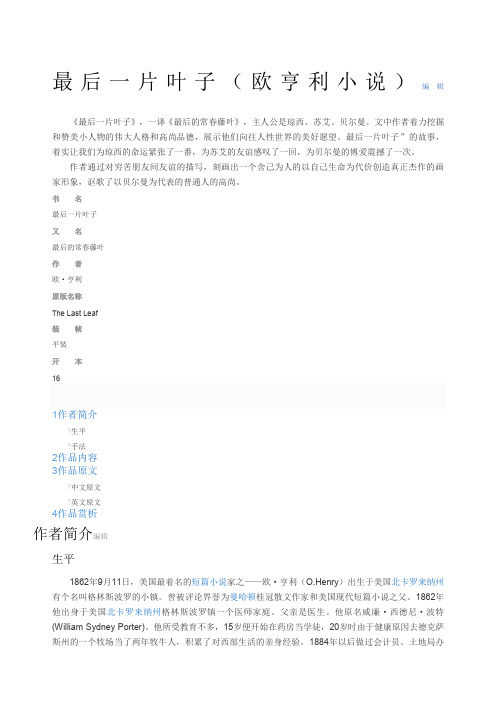
最后一片叶子(欧亨利小说)编辑《最后一片叶子》,一译《最后的常春藤叶》,主人公是琼西、苏艾、贝尔曼。
文中作者着力挖掘和赞美小人物的伟大人格和高尚品德,展示他们向往人性世界的美好愿望。
最后一片叶子”的故事,着实让我们为琼西的命运紧张了一番,为苏艾的友谊感叹了一回,为贝尔曼的博爱震撼了一次。
作者通过对穷苦朋友间友谊的描写,刻画出一个舍己为人的以自己生命为代价创造真正杰作的画家形象,讴歌了以贝尔曼为代表的普通人的高尚。
书名最后一片叶子又名最后的常春藤叶作者欧·亨利原版名称The Last Leaf装帧平装开本161作者简介?生平?手法2作品内容3作品原文?中文原文?英文原文4作品赏析作者简介编辑生平1862年9月11日,美国最着名的短篇小说家之——欧·亨利(O.Henry)出生于美国北卡罗来纳州有个名叫格林斯波罗的小镇。
曾被评论界誉为曼哈顿桂冠散文作家和美国现代短篇小说之父。
1862年他出身于美国北卡罗来纳州格林斯波罗镇一个医师家庭。
父亲是医生。
他原名威廉·西德尼·波特(William Sydney Porter)。
他所受教育不多,15岁便开始在药房当学徒,20岁时由于健康原因去德克萨斯州的一个牧场当了两年牧牛人,积累了对西部生活的亲身经验。
1884年以后做过会计员、土地局办事员、新闻记者。
此后,他在德克萨斯做过不同的工作,包括在奥斯汀银行当出纳员。
他还办过一份名为《滚石》的幽默周刊,并在休斯敦一家日报上发表幽默小说和趣闻逸事。
1887年,亨利结婚并生了一个女儿。
正当他的生活颇为安定之时,却发生了一件改变他命运的事情。
1896年,奥斯汀银行指控他在任职期间盗用资金。
他为了躲避受审,逃往洪都拉斯。
1897年,后因回家探视病危的妻子被捕入狱,判处5年徒刑。
在狱中曾担任药剂师,他创作第一部作品的起因是为了给女儿买圣诞礼物,但基于犯人的身份不敢使用真名,乃用一部法国药典的编者的名字作为笔名,在《麦克吕尔》杂志发表。
最后一片叶子(中英对照)
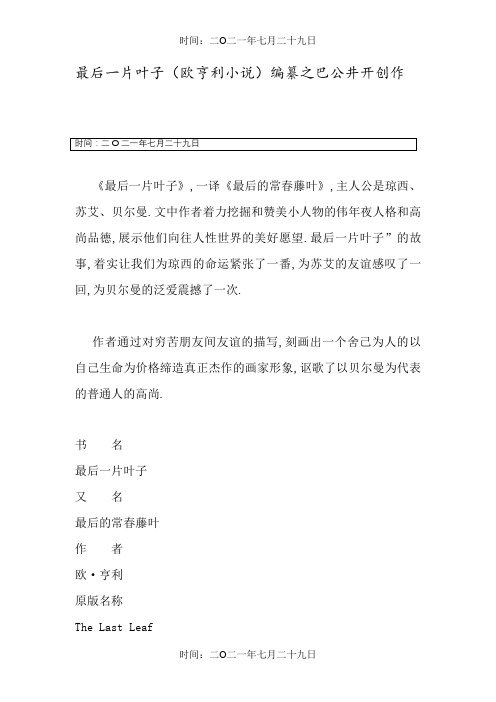
最后一片叶子(欧亨利小说)编纂之巴公井开创作《最后一片叶子》,一译《最后的常春藤叶》,主人公是琼西、苏艾、贝尔曼.文中作者着力挖掘和赞美小人物的伟年夜人格和高尚品德,展示他们向往人性世界的美好愿望.最后一片叶子”的故事,着实让我们为琼西的命运紧张了一番,为苏艾的友谊感叹了一回,为贝尔曼的泛爱震撼了一次.作者通过对穷苦朋友间友谊的描写,刻画出一个舍己为人的以自己生命为价格缔造真正杰作的画家形象,讴歌了以贝尔曼为代表的普通人的高尚.书名最后一片叶子又名最后的常春藤叶作者欧·亨利原版名称The Last Leaf装帧平装开本161作者简介▪生平▪手法2作品内容3作品原文▪中文原文▪英文原文4作品赏析作者简介编纂生平1862年9月11日,美国最著名的短篇小说家之——欧·亨利(O.Henry)出身于美国北卡罗来纳州有个名叫格林斯波罗的小镇.曾被评论界誉为曼哈顿桂冠散文作家和美国现代短篇小说之父.1862年他出身于美国北卡罗来纳州格林斯波罗镇一个医师家庭.父亲是医生.他原名威廉·西德尼·波特(William Sydney Porter).他所受教育未几,15岁便开始在药房当学徒,20岁时由于健康原因去德克萨斯州的一个牧场当了两年牧牛人,积累了对西部生活的亲身经验.1884年以后做过会计员、土地局处事员、新闻记者.尔后,他在德克萨斯做过分歧的工作,包括在奥斯汀银行当出纳员.他还办过一份名为《滚石》的幽默周刊,并在休斯敦一家日报上发表幽默小说和趣闻逸事.1887年,亨利结婚并生了一个女儿. 正当他的生活颇为安宁之时,却发生了一件改变他命运的事情.1896年,奥斯汀银行指控他在任职期间盗用资金.他为了遁藏受审,逃往洪都拉斯.1897年,后因回家探视病危的妻子被捕入狱,判处5年徒刑.在狱中曾担负药剂师,他创作第一部作品的起因是为了给女儿买圣诞礼物,但基于犯人的身份不敢使用真名,乃用一部法国药典的编者的名字作为笔名,在《麦克吕尔》杂志发表.1901年,因“行为良好”提前获释,来到纽约专事写作. 正当他的创作力最旺盛的时候,健康状况却开始恶化,于1910年病逝.欧·亨利在年夜概十年的时间内创作了短篇小说共有300多篇,收入《白菜与国王》(1904)[其唯一一部长篇,作者通过四五条并行的线索,试图描绘出一幅广阔的画面,在写法上有它的新颖之处.不外从另一方面看,小说章与章之间的内在联系不够紧密,各有自力的内容]、《四百万》(1906)、《西部之心》(1907)、《市声》(1908)、《滚石》(1913)等集子,其中以描写纽约曼哈顿市民生活的作品为最著名.他把那儿的街道、小饭馆、破旧的公寓的气氛渲染得十分逼真,故有“曼哈顿的桂冠诗人”之称.他曾以骗子的生活为题材,写了很多短篇小说.作者企图标明不苟言笑的上流社会里,有很多人就是高级的骗子,胜利的骗子.欧·亨利对社会与人生的观察和分析其实不深刻,有些作品比力浅薄,但他一生困顿,常与失意落魄的小人物同甘共苦,又能以别具一格的艺术手法暗示他们复杂的感情.他的作品构思新颖,语言诙谐,结局经常出人意外;又因描写了众多的人物,富于生活情趣,被誉为“美国生活的幽默百科全书”.因此,他最超卓的短篇小说如《爱的牺牲》(A Service of Love)、《警察与赞美诗》(The Cop and the Anthem)、《带家具出租的房间》(The Furnished Room)、《麦琪的礼物》(The Gift of the Magi)、《最后的常春藤叶》(The Last Leaf)等都可列入世界优秀短篇小说之中.他的文字生动活泼,善于利用双关语、讹音、谐音和旧典新意,妙趣横生,被喻为[含泪的微笑].他还以准确的细节描写,制造与再现气氛,特别是年夜城市夜生活的气氛.手法欧·亨利还以擅长结尾闻名遐迩,美国文学界称之为“欧·亨利式的结尾”他善于戏剧性地设计情节,埋下伏笔,作好铺垫,勾勒矛盾,最后在结尾处突然让人物的心理情境发生出其不意的变动,或使主人公命运陡然逆转,使读者感到豁然开朗,柳暗花明,既在意料之外,又在情理之中,不由拍案称奇,从而造成共同的艺术魅力.有一种被称为“含泪的微笑”的共同艺术风格.欧·亨利把小说的灵魂全都凝聚在结尾部份,让读者在前的似乎是平淡无奇的而又是诙谐风趣的娓娓动人的描述中,不知不觉地进入作者精心设置的迷宫,直到最后,忽如电光一闪,才照亮了先前隐藏着的一切,仿佛在和读者捉迷藏,或者在玩弄障眼法,给读者最后一个惊喜.在欧·亨利之前,其他短篇小说家也已经这样检验考试过这种出其不意的结局.可是欧·亨利对此运用得更为经常,更为自然,也更为熟练老到.作品内容编纂穷画家琼珊得了重病,在病房里看着窗外对面树上的常春藤叶子不竭被风吹落,她认为最后一片叶子的凋零代表自己的死亡,于是她失去了生存的意志.医生认为再这样下去琼珊会死去.贝尔曼,一个伟年夜的画家,在听完苏艾讲述室友琼珊的事情后,夜里冒着暴雨,用心灵的画笔画出了一片“永不凋零”的常春藤叶,让琼珊重拾对生命的希望,而自己却因此患上肺炎,去世了.作品原文编纂中文原文在华盛顿广场西面的一个小区里,街道仿佛发了狂似的分成了许多叫做“巷子”的小胡同.这些“巷子”形成许多奇特的角度和曲线.一条街有时自己自己就交叉了不止一次.有一回一个画家发现这条街有他的可贵之处.如果一个商人去收颜料、纸张和画布的账款,在这条街上转弯抹角、年夜兜圈子的时候,突然碰到一毛钱也没收到、空手而归的自己,那才有意思呢!所以,不久之后很多画家就摸索到这个古色古香的老格林尼治村来了.他们逛来逛去,寻求朝北的窗户、18世纪的三角墙、荷兰式的阁楼,以及昂贵的房租.然后,他们又从第六街买来一些锡蜡杯子和一两只烘锅,组成了一个“艺术区”.苏艾和琼珊在一座矮墩墩的的三层楼砖屋的顶楼设立了她们的画室.“琼珊”是琼西的昵称.她俩一个来自缅因州,一个是加利福尼亚州人.她们是在德尔蒙戈饭馆吃客饭时碰到的,彼此一谈,发现她们对艺术、饮食、衣着的口味十分相投,结果便联合租下了那间画室.那是5月里的事.到了11月,一个冷酷的、肉眼看不见的、医生们叫做“肺炎”的不速之客,在艺术区里悄悄地游荡,用他冰凉的手指头这里碰一下那里碰一下.在广场东头,这个破坏者明目张胆地踏着年夜步,一下子就击倒几十个受害者,可是在迷宫一样、狭窄而铺满青的“胡同”里,他的法式就慢了下来.肺炎先生不是一个你们心目中行侠仗义的老绅士.一个身子薄弱,被加利福尼亚州的西风刮得没有血色的弱女子,原本不应该是这个有着红拳头的、呼吸急促的老家伙冲击的对象.然而,琼西却遭到了冲击;她躺在一张油漆过的铁床上,一动也不动,凝望着小小的荷兰式玻璃窗外对面砖房的空墙.一天早晨,那个忙碌的医生扬了扬他那毛茸茸的灰白色眉毛,把苏叫到外边的走廊上.“我看,她的病只有一成希望,”他说,一面把体温内外的水银甩下去,“这一成希望在于她自己要不要活下去.人们不想活,情愿照顾殡仪馆的生意,这种精神状态使医药一筹莫展.你的这位小姐满肚子以为自己不会好了.她有什么心事吗?”“她——她希望有一天能够去画那不勒斯海湾.”苏艾说.“绘画?——别瞎扯了!她心里有没有值得想两次的事情.比如说,[1]男人?”“男人?”苏艾像吹口琴似的扯着嗓子说,“男人难道值得... ...不,医生,没有这样的事.”“能到达的全部力量去治疗她.可要是我的病人开始算计会有几多辆马车送她出丧,我就得把治疗的效果减失落百分之五十.只要你能想法让她对夏季年夜衣袖子的时新式样感到兴趣而提出一两个问题,那我可以向你保证把医好她的机会从十分之一提高到五分之一.”医生走后,苏艾走进工作室里,把一条日本餐巾哭成一团湿.后来她手里拿着画板,装做精神奋起的样子走进琼西的屋子,嘴里吹着爵士音乐调子.琼西躺着,脸朝着窗口,被子底下的身体纹丝不动.苏以为她睡着了,赶忙停止吹口哨.她架好画板,开始给杂志里的故事画一张钢笔插图.年轻的画家为了铺平通向艺术的路途,不能不给杂志里的故事画插图,而这些故事又是年轻的作家为了铺平通向文学的路途而不能不写的.苏艾正在给故事主人公,一个爱达荷州牧人的身上,画上一条马匹展览会穿的时髦马裤和一片单眼镜时,忽然听到一个重复了几次的卑微的声音.她快步走到床边.琼珊的眼睛睁得很年夜.她望着窗外,数着……倒过来数.“12,”她数道,歇了一会又说,“11”,然后是“10”,和“9”,接着几乎同时数着“8”和“7”.苏艾关切地看了看窗外.那儿有什么可数的呢?只见一个空荡阴暗的院子,20英尺以外还有一所砖房的空墙.一棵老极了的常春藤,枯萎的根纠结在一块,枝干攀在砖墙的半腰上.秋天的寒风把藤上的叶子差未几全都吹失落了,几乎只有光秃的枝条还缠附在剥落的砖块上.“什么,亲爱的?”苏问道.“6,”琼西几乎用耳语低声说道,“它们现在越落越快了.三天前还有差未几一百片.我数得头都疼了.可是现在好数了.又失落了一片.只剩下五片了.”“五片什么,亲爱的.告诉你的苏艾.”“叶子.常春藤上的.比及最后一片叶子失落下来,我也就该去了.这件事我三天前就知道了.难道医生没有告诉你?”“哟,我历来没听过这么荒唐的话,”苏艾满不在乎地说,“那些破常春藤叶子同你的病有什么相干?你以前不是很喜欢这棵树吗?得啦,你这个淘气的姑娘.不要说傻话了.瞧,医生今天早晨还告诉我,说你迅速痊愈的机会是,让我想想他是怎么说的---他说你好的几率有十比一!噢,那简直和我们在纽约坐电车或者走过一座新楼房的掌控一样年夜.喝点汤吧,让苏艾去画她的画,好把它卖给编纂先生,换了钱来给她的病孩子买点红葡萄酒,再买些猪排给自己解解馋.”“你不用买酒了,”琼珊的眼睛直盯着窗外说道,“又落了一片.不,我不想喝汤.只剩下四片了.我想在天黑以前等着看那最后一片叶子失落下去.然后我也要去了.”“琼珊,亲爱的,”苏艾俯着身子对她说,“等我画完行吗?明天我一定得交出这些插图.我需要光线,否则我就拉下窗帘了.”“你就不能到另一间屋子里去画吗?”琼西冷冷地问道.“我要在这儿陪你,和你在一起,”苏艾说,“再说,我不喜欢你老是盯着那些叶子看.”“你一画完就叫我,”琼珊说着,便闭上了眼睛.她脸色苍白,一动不动地躺在床上,就像是座横倒在地上的雕像.“因为我想看那最后一片叶子失落下来,我等得不耐烦了,也想得不耐烦了.我想解脱一切,飘下去,飘下去,像一片可怜的疲倦了的叶子那样.”“你争取睡一会儿,”苏艾说道,“我得下楼把贝尔曼叫上来,给我当那个隐居的老矿工的模特儿.我一会儿就会回来的.你不要动,等我回来.”老贝尔曼是住在她们这座楼房底层的一个画家.他年过60,有一把像米开朗琪罗的摩西雕像那样的年夜胡子,这胡子长在一个像半人半兽的森林之神的头颅上,又鬈曲地飘拂在小鬼似的身躯上.贝尔曼是个失败的画家.他操了四十年的画笔,还远没有摸着艺术女神的衣裙.他老是说就要画他的那幅杰作了,可是直到现在他还没有动笔.几年来,他除偶尔画点商业广告之类的玩意儿以外,什么也没有画过.他给艺术区里穷得雇不起职业模特儿的年轻画家们当模特儿,挣一点钱.他喝酒毫无节制,还时常提起他要画的那幅杰作.除此以外,他是一个火气十足的小老头子,十分瞧不起他人的温情,却认为自己是专门呵护楼上画室里那两个年轻女画家的一只看家犬.苏艾在楼下他那间光线昏暗的小房里找到了贝尔曼,满嘴酒气扑鼻.一幅空白的画布绷在个画架上,摆在屋角里,等候那幅杰作已经25年了,可是连一根线条都还没等着.苏艾把琼珊的胡思乱想告诉了他,还说她害怕琼珊自个儿瘦小柔弱得像一片叶子一样,对这个世界的留恋越来越微弱,恐怕真会离世飘走了.老贝尔曼两只发红的眼睛显然在迎风流泪,他十分轻蔑地嗤笑这种傻呆的胡思乱想.“什么,”他喊道,“世界上竟会有人蠢到因为那些该死的常春藤叶子落失落就想死?我历来没有听说过这种怪事.不,我才没功夫给你那隐居的矿工糊涂虫当模特儿呢.你怎么可以让她胡思乱想?唉,可怜的琼珊小姐.”“她病得很厉害很虚弱,”苏艾说,“发高烧发得她神经昏乱,满脑子都是古怪想法.好吧,贝尔曼先生,你不愿意给我当模特儿就算了,我看你是个讨厌的老... ...老啰唆鬼.”“你简直太婆婆妈妈了!”贝尔曼喊道,“谁说我不愿意当模特儿?走,我和你一块去.我不是讲了半天愿意给你当模特儿吗?老天爷,像琼珊小姐这么好的姑娘真不应该躺在这种处所生病.总有一天我要画一幅杰作,那时我们就可以都搬出去了.““一定的!”他们上楼以后,琼珊正睡着觉.苏艾把窗帘拉下,一直遮住窗台,做手势叫贝尔曼到隔壁屋子里去.他们在那里提心吊胆地瞅着窗外那棵常春藤.后来他们默默无言,彼此对望了一会.寒冷的雨夹杂着雪花不竭地下着.贝尔曼穿戴他的旧蓝衬衣,坐在一把翻过来充任岩石的铁壶上,扮作隐居的矿工.第二天早晨,苏艾只睡了一个小时的觉,醒来了,她看见琼珊无神的眼睛睁得年夜年夜地注视拉下的绿窗帘.“把窗帘拉起来,我要看看.”她低声地命令道.苏艾疲倦地照办了.然而,看呀!经过了漫长一夜的风吹雨打,在砖墙上还挂着一片藤叶.它是常春藤上最后的一片叶子了.靠近茎部仍然是深绿色,可是锯齿形的叶子边缘已经枯萎发黄,它傲然挂在一根离地二十多英尺的藤枝上.“这是最后一片叶子.”琼珊说道,“我以为它昨晚一定会落失落的.我听见风声了.今天它一定会落失落,我也会死的.”“哎呀,哎呀,”苏艾把疲乏的脸庞靠近枕头边上对她说,“你不愿为自己着想,也得为我想想啊.我可怎么办呢?”可是琼珊不回答.当一个灵魂正在准备走上那神秘的、遥远的死亡之途时,她是世界上最寂寞的人了.那些把她和友谊极年夜地联结起来的关系逐渐消失以后,她那个狂想越来越强烈了.白天总算过去了,甚至在暮色中她们还能看见那片孤零零的藤叶仍紧紧地依附在靠墙的枝上.后来,夜的来临带来呼啸的北风,雨点不竭地拍打着窗子,雨水从高扬的荷兰式屋檐上流泻下来.天刚蒙蒙亮,琼珊就毫不留情地吩咐拉起窗帘来.那片枯藤叶仍然在那里.琼珊躺着对它看了许久.然后她招呼正在煤气炉上给她煮鸡汤的苏.“我是一个坏女孩儿,苏艾,”琼珊说,“天意让那片最后的藤叶留在那里,证明我曾有何等坏.想死是有罪的.你现在就给我拿点鸡汤来,再拿点掺葡萄酒的牛奶来,再---不,先给我一面小镜子,再把枕头垫垫高,我要坐起来看你做饭.”过了一个钟头,她说道:“苏艾,我希望有一天能去画那不勒斯的海湾.”下午医生来了,他走的时候,苏艾找了个借口跑到走廊上.“有五成希望.”医生一面说,一面把苏艾细瘦的颤抖的手握在自己的手里,“好好护理,你会胜利的.现在我得去看楼下另一个病人.他的名字叫贝尔曼... ...听说也是个画家,也是肺炎.他年纪太年夜,身体又弱,病势很重.他是治欠好的了,今天要把他送到医院里,让他更舒服一点.”第二天,医生对苏艾说:“她已经脱离危险,你胜利了.现在只剩下营养和护理了.”下午苏艾跑到琼珊的床前,琼珊正躺着,安详地编织着一条毫无用处的深蓝色毛线披肩.苏艾用一只胳臂连枕头带人一把抱住了她.“我有件事要告诉你,小家伙,”她说,“贝尔曼先生今天在医院里患肺炎去世了.他只病了两天.头一天早晨,门房发现他在楼下自己那间房里痛得转动不了.他的鞋子和衣服全都湿透了,冰凉冰凉的.他们搞不清楚在那个凄风苦雨的夜晚,他究竟到哪里去了.后来他们发现了一盏没有熄灭的灯笼,一把挪动过处所的梯子,几支扔得满地的画笔,还有一块调色板,上面涂抹着绿色和黄色的颜料,还有,亲爱的,瞧瞧窗子外面,瞧瞧墙上那最后一片藤叶.难道你没有想过,为什么风刮得那样厉害,它却历来不摇一摇、动一动呢?唉,亲爱的,这片叶子才是贝尔曼的杰作.就是在最后一片叶子失落下来的晚上,他把它画在那里的.”英文原文In a little district west of Washington Square the streets have run crazy and broken themselves into small strips called "places." These "places" make strange angles and curves. One Street crosses itself a time or two. An artist once discovered a valuable possibility in this street. Suppose a collector with a bill for paints, paper and canvas should, in traversing this route, suddenly meet himself coming back, without a cent having been paid on account!So, to quaint old Greenwich Village the art people soon came prowling, hunting for north windows and eighteenth-century gables and Dutch attics and low rents.Then they imported some pewter mugs and a chafing dish or two from Sixth Avenue, and became a "colony."At the top of a squatty, three-story brick Sue and Johnsy had their studio. "Johnsy" was familiar for Joanna. One was from Maine; the other from California. They had met at the table d'hôte of an Eighth Street "Delmonico's," and found their tastes in art, chicory salad and bishop sleeves so congenial that the joint studio resulted.That was in May. In November a cold, unseen stranger, whom the doctors called Pneumonia, stalked about the colony, touching one here and there with his icy fingers. Over on the east side this ravager strode boldly, smiting his victims by scores, but his feet trod slowly through the maze of the narrow and moss-grown "places."Mr. Pneumonia was not what you would call a chivalric old gentleman. A mite of a little woman with blood thinned by California zephyrs was hardly fair game for the red-fisted, short-breathed old duffer. But Johnsy he smote; and she lay, scarcely moving, on her painted iron bedstead, looking through the small Dutch window-panes atthe blank side of the next brick house.One morning the busy doctor invited Sue into the hallway with a shaggy, grey eyebrow."She has one chance in - let us say, ten," he said, as he shook down the mercury in his clinical thermometer. " And that chance is for her to want to live. This way people have of lining-u on the side of the undertaker makes the entire pharmacopoeia look silly. Your little lady has made up her mind that she's not going to get well. Has she anything on her mind?""She - she wanted to paint the Bay of Naples some day." said Sue."Paint? - bosh! Has she anything on her mind worth thinking twice - a man for instance?""A man?" said Sue, with a jew's-harp twang in her voice. "Is a man worth - but, no, doctor; there is nothing of the kind.""Well, it is the weakness, then," said the doctor. "I will do all that science, so far as it may filter through my efforts, can accomplish. But whenever my patientbegins to count the carriages in her funeral procession I subtract 50 per cent from the curative power of medicines. If you will get her to ask one question about the new winter styles in cloak sleeves I will promise you a one-in-five chance for her, instead of one in ten."After the doctor had gone Sue went into the workroom and cried a Japanese napkin to a pulp. Then she swaggered into Johnsy's room with her drawing board, whistling ragtime.Johnsy lay, scarcely making a ripple under the bedclothes, with her face toward the window. Sue stopped whistling, thinking she was asleep.She arranged her board and began a pen-and-ink drawing to illustrate a magazine story. Young artists must pave their way to Art by drawing pictures for magazine stories that young authors write to pave their way to Literature.As Sue was sketching a pair of elegant horseshow riding trousers and a monocle of the figure of the hero, an Idaho cowboy, she heard a low sound, several times repeated. She went quickly to the bedside.Johnsy's eyes were open wide. She was looking out the window and counting - counting backward."Twelve," she said, and little later "eleven"; and then "ten," and "nine"; and then "eight" and "seven", almost together.Sue look solicitously out of the window. What was there to count? There was only a bare, dreary yard to be seen, and the blank side of the brick house twenty feet away. An old, old ivy vine, gnarled and decayed at the roots, climbed half way up the brick wall. The cold breath of autumn had stricken its leaves from the vine until its skeleton branches clung, almost bare, to the crumbling bricks."What is it, dear?" asked Sue."Six," said Johnsy, in almost a whisper. "They're falling faster now. Three days ago there were almost a hundred. It made my head ache to count them. But now it's easy. There goes another one. There are only five left now.""Five what, dear? Tell your Sudie.""Leaves. On the ivy vine. When the last one falls I must go, too. I've known that for three days. Didn't the doctor tell you?""Oh, I never heard of such nonsense," complained Sue, with magnificent scorn. "What have old ivy leaves to do with your getting well? And you used to love that vine so, you naughty girl. Don't be a goosey. Why, the doctor told me this morning that your chances for getting well real soon were - let's see exactly what he said - he said the chances were ten to one! Why, that's almost as good a chance as we have in New York when we ride on the street cars or walk past a new building. Try to take some broth now, and let Sudie go back to her drawing, so she can sell the editor man with it, and buy port wine for her sick child, and pork chops for her greedy self.""You needn't get any more wine," said Johnsy, keeping her eyes fixed out the window. "There goes another. No, I don't want any broth. That leaves just four. I want to see the last one fall before it gets dark. Then I'll go, too.""Johnsy, dear," said Sue, bending over her, "will youpromise me to keep your eyes closed, and not look out the window until I am done working? I must hand those drawings in by to-morrow. I need the light, or I would draw the shade down.""Couldn't you draw in the other room?" asked Johnsy, coldly."I'd rather be here by you," said Sue. "Beside, I don't want you to keep looking at those silly ivy leaves.""Tell me as soon as you have finished," said Johnsy, closing her eyes, and lying white and still as fallen statue, "because I want to see the last one fall. I'm tired of waiting. I'm tired of thinking. I want to turn loose my hold on everything, and go sailing down, down, just like one of those poor, tired leaves.""Try to sleep," said Sue. "I must call Behrman up to be my model for the old hermit miner. I'll not be gone a minute. Don't try to move 'til I come back."Old Behrman was a painter who lived on the ground floor beneath them. He was past sixty and had a MichaelAngelo's Moses beard curling down from the head of a satyr along with the body of an imp. Behrman was a failure in art. Forty years he had wielded the brush without getting near enough to touch the hem of his Mistress's robe. He had been always about to paint a masterpiece, but had never yet begun it. For several years he had painted nothing except now and then a daub in the line of commerce or advertising. He earned a little by serving as a model to those young artists in the colony who could not pay the price of a professional. He drank gin to excess, and still talked of his coming masterpiece. For the rest he was a fierce little old man, who scoffed terribly at softness in any one, and who regarded himself as especial mastiff-in-waiting to protect the two young artists in the studio above.Sue found Behrman smelling strongly of juniper berries in his dimly lighted den below. In one corner was a blank canvas on an easel that had been waiting there for twenty-five years to receive the first line of the masterpiece. She told him of Johnsy's fancy, and how she feared she would, indeed, light and fragile as a leaf herself, float away, when her slight hold upon the worldgrew weaker.Old Behrman, with his red eyes plainly streaming, shouted his contempt and derision for such idiotic imaginings."Vass!" he cried. "Is dere people in the world mit der foolishness to die because leafs dey drop off from a confounded vine? I haf not heard of such a thing. No, I will not bose as a model for your fool hermit-dunderhead. Vy do you allow dot silly pusiness to come in der brain of her? Ach, dot poor leetle Miss Yohnsy.""She is very ill and weak," said Sue, "and the fever has left her mind morbid and full of strange fancies. Very well, Mr. Behrman, if you do not care to pose for me, you needn't. But I think you are a horrid old - old flibbertigibbet.""You are just like a woman!" yelled Behrman. "Who said I will not bose? Go on. I come mit you. For half an hour I haf peen trying to say dot I am ready to bose. Gott! dis is not any blace in which one so goot as Miss Yohnsy shall lie sick. Some day I vill baint a masterpiece, and ve shall all go away. Gott! yes."。
最后一片叶子[中英对照]
![最后一片叶子[中英对照]](https://img.taocdn.com/s3/m/5d939e633c1ec5da50e270ca.png)
最后一片叶子(欧亨利小说)编辑《最后一片叶子》,一译《最后的常春藤叶》,主人公是琼西、苏艾、贝尔曼。
文中作者着力挖掘和赞美小人物的伟大人格和高尚品德,展示他们向往人性世界的美好愿望。
最后一片叶子”的故事,着实让我们为琼西的命运紧张了一番,为苏艾的友谊感叹了一回,为贝尔曼的博爱震撼了一次。
作者通过对穷苦朋友间友谊的描写,刻画出一个舍己为人的以自己生命为代价创造真正杰作的画家形象,讴歌了以贝尔曼为代表的普通人的高尚。
书名最后一片叶子又名最后的常春藤叶作者欧·亨利原版名称The Last Leaf装帧平装开本161作者简介▪生平▪手法2作品内容3作品原文▪中文原文▪英文原文4作品赏析1作者简介编辑生平1862年9月11日,美国最著名的短篇小说家之——欧·亨利(O.Henry)出生于美国北卡罗来纳州有个名叫格林斯波罗的小镇。
曾被评论界誉为曼哈顿桂冠散文作家和美国现代短篇小说之父。
1862年他出身于美国北卡罗来纳州格林斯波罗镇一个医师家庭。
父亲是医生。
他原名威廉·西德尼·波特(William Sydney Porter)。
他所受教育不多,15岁便开始在药房当学徒,20岁时由于健康原因去德克萨斯州的一个牧场当了两年牧牛人,积累了对西部生活的亲身经验。
1884年以后做过会计员、土地局办事员、新闻记者。
此后,他在德克萨斯做过不同的工作,包括在奥斯汀银行当出纳员。
他还办过一份名为《滚石》的幽默周刊,并在休斯敦一家日报上发表幽默小说和趣闻逸事。
1887年,亨利结婚并生了一个女儿。
正当他的生活颇为安定之时,却发生了一件改变他命运的事情。
1896年,奥斯汀银行指控他在任职期间盗用资金。
他为了躲避受审,逃往洪都拉斯。
1897年,后因回家探视病危的妻子被捕入狱,判处5年徒刑。
在狱中曾担任药剂师,他创作第一部作品的起因是为了给女儿买圣诞礼物,但基于犯人的身份不敢使用真名,乃用一部法国药典的编者的名字作为笔名,在《麦克吕尔》杂志发表。
thelastleaf课文原文及翻译

thelastleaf课文原文及翻译The Last LeafBeside the artery of the little street, there was a small IRISH shop. Across the street, there was an old brown art studio with a large sofa near the windows. Two young friends, Johnsy and Sue, most of the time stayed in the little studio.在那条小街道的一头,有一间小小的爱尔兰商店。
街对面,有一间陈色的艺术工作室,室内靠窗有一张大沙发。
两个年轻的朋友约翰西和苏,大部分时间呆在那间小工作室里。
It was the autumn of the year and the city had cold wind blowing in from the sea. One night, Johnsy made a statement that she hoped all the ivy leaves would be gone from the wall. They were the last leaves on the old wall, and now they were all shaking because of the cold wind.当时正值秋天,海风带来寒意。
一天晚上,约翰西说,希望墙上所有常春藤的叶子能够掉光。
它们是那陈旧墙壁上的最后一片叶子,现在受到寒风的吹动,正在摇曳。
Sue told her that it was a silly idea, but Johnsy just wanted to see the last leaf fall to make her happy. Then Sue went out to have a look at the leaves. Strangely, there was still one leaf on the wall, but it was not moving, no matter how much the wind blew.苏认为约翰西的想法很蠢,但约翰西仍然希望看到最后一片叶子掉落,让自己乐上加乐。
【教材解读】语篇研读—The Last Leaf

本文改编自美国著名短篇小说家 欧•亨利的作品《最后一片叶子》。
患肺病奄奄一息的穷学生Johnsy因窗外一片经历寒风却依然留存 的常青藤叶子而重拾信心,顽强地活了下来。而这片叶子是老画家 Behrman为了鼓励和帮助Johnsy,在一个风雨交加的夜晚画在墙上的 。老画家因此患上肺炎,去世了。
结尾
“Behrman died today. He was ill for only two days. … Didn’t you wonder why it never moved an inch when the wind blew? … it’s Behrman’s masterpiece — he painted it there the night when the last leaf fell.”
语篇研读——The Last Leaf
本文通过描写老画家为患重病而奄奄一息的穷学生画最后一 片常春藤叶子的故事,揭示了深刻的人性美文学主题。引导学生 思考希望带给生命的意义;体会和学习老画家舍己为eaf
本文的语篇类型是小说 。
小说一般具有故事情节完整、人物个性鲜明、主题思想深刻、构思 角度精巧等特点。本文作者以第三人称叙述故事,以时间为主线推动 情节发展,最后用一个颠覆读者所有假想的剧情结尾,撞击读者心灵 、引发读者思考的同时,使小说主题得到升华。
语篇研读——The Last Leaf
时间顺序
In November, a cold, unseen stranger, whom …; The next morning, Johnsy woke and asked for …; The following day, Johnsy asked again for …; In the afternoon, the doctor visited …; The next day, Sue came to Johnsy’s bed.
最后一片叶子(中英对照)之欧阳治创编

最后一片叶子(欧亨利小说)编辑《最后一片叶子》,一译《最后的常春藤叶》,主人公是琼西、苏艾、贝尔曼。
文中作者着力挖掘和赞美小人物的伟大人格和高尚品德,展示他们向往人性世界的美好愿望。
最后一片叶子”的故事,着实让我们为琼西的命运紧张了一番,为苏艾的友谊感叹了一回,为贝尔曼的博爱震撼了一次。
作者通过对穷苦朋友间友谊的描写,刻画出一个舍己为人的以自己生命为代价创造真正杰作的画家形象,讴歌了以贝尔曼为代表的普通人的高尚。
书名最后一片叶子又名最后的常春藤叶作者欧·亨利原版名称The Last Leaf装帧平装开本161作者简介▪生平▪手法2作品内容3作品原文▪中文原文▪英文原文4作品赏析作者简介编辑生平1862年9月11日,美国最著名的短篇小说家之——欧·亨利(O.Henry)出生于美国北卡罗来纳州有个名叫格林斯波罗的小镇。
曾被评论界誉为曼哈顿桂冠散文作家和美国现代短篇小说之父。
1862年他出身于美国北卡罗来纳州格林斯波罗镇一个医师家庭。
父亲是医生。
他原名威廉·西德尼·波特(William Sydney Porter)。
他所受教育不多,15岁便开始在药房当学徒,20岁时由于健康原因去德克萨斯州的一个牧场当了两年牧牛人,积累了对西部生活的亲身经验。
1884年以后做过会计员、土地局办事员、新闻记者。
此后,他在德克萨斯做过不同的工作,包括在奥斯汀银行当出纳员。
他还办过一份名为《滚石》的幽默周刊,并在休斯敦一家日报上发表幽默小说和趣闻逸事。
1887年,亨利结婚并生了一个女儿。
正当他的生活颇为安定之时,却发生了一件改变他命运的事情。
1896年,奥斯汀银行指控他在任职期间盗用资金。
他为了躲避受审,逃往洪都拉斯。
1897年,后因回家探视病危的妻子被捕入狱,判处5年徒刑。
在狱中曾担任药剂师,他创作第一部作品的起因是为了给女儿买圣诞礼物,但基于犯人的身份不敢使用真名,乃用一部法国药典的编者的名字作为笔名,在《麦克吕尔》杂志发表。
the last leaf课件

the last leaf课件《最后一片叶子》课件一、引言在我们的生活中,总会有一些让人难以忘怀的故事。
而在文学作品中,也有一些经典的故事,其中之一就是奧亨利的短篇小说《最后一片叶子》。
这个故事以其深刻的主题和感人的情节,给人们带来了许多的思考和启示。
本文将通过对《最后一片叶子》的课件分析,探讨其中所蕴含的主题和情感,以及对我们生活的启示。
二、故事背景《最后一片叶子》讲述了一个发生在纽约的故事。
一个年轻的女艺术家苏西在一间小阁楼里生活,她患上了重病。
窗外的树上有一片仅剩的叶子,但随着秋天的到来,这片叶子也逐渐凋零。
苏西的邻居约翰逊老太太和她的丈夫也住在同一栋楼里,他们对苏西非常关心。
三、主题探讨1. 生命与希望在《最后一片叶子》中,生命和希望是贯穿始终的主题。
苏西生病后,她感到绝望和无助,但她的邻居约翰逊夫妇却一直给予她关怀和支持。
约翰逊太太为了给苏西带来希望,将窗外的树叶涂成绿色,让苏西误以为秋天还没有来临。
这种希望和对生命的执着,使得苏西的情绪得到了缓解,她重新燃起了对生活的热情。
2. 爱与友情《最后一片叶子》中的爱与友情也是故事的重要元素。
约翰逊夫妇对苏西的关心和照顾,展现了他们之间深厚的友情。
他们不仅为苏西提供了物质上的帮助,还给予了她精神上的支持。
他们的爱和友情,让苏西感受到了温暖和安慰,使她能够坚持下去。
3. 人性与艺术《最后一片叶子》还探讨了人性与艺术的关系。
苏西是一位年轻的艺术家,她对艺术的热爱和追求使她的生活充满了意义。
然而,当她生病后,她开始怀疑自己的艺术是否有价值。
在这个过程中,约翰逊夫妇的关爱和支持不仅让她重新找回了对艺术的信心,也让她明白艺术的力量可以超越一切困难。
四、情感分析1. 绝望与希望故事中苏西的绝望和希望是情感的核心。
当她看到窗外的树叶逐渐凋零时,她感到了无助和绝望。
然而,约翰逊夫妇的行为给予了她希望,使她重新找回了对生活的热情。
这种由绝望到希望的情感转变,让人们深受感动。
最后一片叶子[中英对照]
![最后一片叶子[中英对照]](https://img.taocdn.com/s3/m/5d939e633c1ec5da50e270ca.png)
最后一片叶子(欧亨利小说)编辑《最后一片叶子》,一译《最后的常春藤叶》,主人公是琼西、苏艾、贝尔曼。
文中作者着力挖掘和赞美小人物的伟大人格和高尚品德,展示他们向往人性世界的美好愿望。
最后一片叶子”的故事,着实让我们为琼西的命运紧张了一番,为苏艾的友谊感叹了一回,为贝尔曼的博爱震撼了一次。
作者通过对穷苦朋友间友谊的描写,刻画出一个舍己为人的以自己生命为代价创造真正杰作的画家形象,讴歌了以贝尔曼为代表的普通人的高尚。
书名最后一片叶子又名最后的常春藤叶作者欧·亨利原版名称The Last Leaf装帧平装开本161作者简介▪生平▪手法2作品内容3作品原文▪中文原文▪英文原文4作品赏析1作者简介编辑生平1862年9月11日,美国最著名的短篇小说家之——欧·亨利(O.Henry)出生于美国北卡罗来纳州有个名叫格林斯波罗的小镇。
曾被评论界誉为曼哈顿桂冠散文作家和美国现代短篇小说之父。
1862年他出身于美国北卡罗来纳州格林斯波罗镇一个医师家庭。
父亲是医生。
他原名威廉·西德尼·波特(William Sydney Porter)。
他所受教育不多,15岁便开始在药房当学徒,20岁时由于健康原因去德克萨斯州的一个牧场当了两年牧牛人,积累了对西部生活的亲身经验。
1884年以后做过会计员、土地局办事员、新闻记者。
此后,他在德克萨斯做过不同的工作,包括在奥斯汀银行当出纳员。
他还办过一份名为《滚石》的幽默周刊,并在休斯敦一家日报上发表幽默小说和趣闻逸事。
1887年,亨利结婚并生了一个女儿。
正当他的生活颇为安定之时,却发生了一件改变他命运的事情。
1896年,奥斯汀银行指控他在任职期间盗用资金。
他为了躲避受审,逃往洪都拉斯。
1897年,后因回家探视病危的妻子被捕入狱,判处5年徒刑。
在狱中曾担任药剂师,他创作第一部作品的起因是为了给女儿买圣诞礼物,但基于犯人的身份不敢使用真名,乃用一部法国药典的编者的名字作为笔名,在《麦克吕尔》杂志发表。
- 1、下载文档前请自行甄别文档内容的完整性,平台不提供额外的编辑、内容补充、找答案等附加服务。
- 2、"仅部分预览"的文档,不可在线预览部分如存在完整性等问题,可反馈申请退款(可完整预览的文档不适用该条件!)。
- 3、如文档侵犯您的权益,请联系客服反馈,我们会尽快为您处理(人工客服工作时间:9:00-18:30)。
The Last Leaf is a short story written by O Henry, Settled in Greenwich Village. Its depicts characters and themes are typically of O Henry’s work.
最后一片叶子是由住在格林威治村的欧亨利写的一个短篇故事。
它所描写的人物和主题是欧亨利的经典作品。
Johnsy has fallen ill and is dying of pneumonia. She watches the leaves falling from the window of her room, and decides that when the last leaf drops, she will die, too. To encourage her, Mr. Behrman painted the last leaf in a stormy night but he died of pneumonia because of his efforts in the storm.
琼西已经生病了而且将要死于肺炎。
她从她房间的窗户上看着叶子坠落,并认定当最后一片叶子掉下来的时候,她就会死。
为了鼓励她,贝尔曼先生在一个风雨交加的夜晚画了最后一片叶子,但他却由于在风暴中的努力而死于肺炎。
This is a sad story about sacrifice as well as a moving story about hope. Likewise, we can learn about something from this story, something that totally different from each other.
这是一个关于牺牲的伤感故事同时也是关于希望的感人故事。
而且我们也可以从这个故事中学到一些东西,一些完全不一样的东西。
Everyone has a certain purpose that support all his life, and we call it hope. Hope means an oasis to a man walking in the desert.
From Johnsy’s recovery, there’s no doubt that hope is her holy light which points out her direction.
每个人都有一定的目的来支撑他的生活,我们称之为希望。
对于走在沙漠上的人,希望就犹如是绿洲。
从琼西的恢复情况来看,毫无疑问,希望是给她指引方向的圣洁的光芒。
Meanwhile, everything should be paid off, including kindness. Maybe we can consider Johnsy’s recovery as an exchange with Mr. Be hrman’s sacrifice. No wonder it will be a cruel comparison, but it is an universal routine in the world. In addition, it warns us not to let ourselves have our own way without limitation.
同时,所有的东西都是要还的,包括善良。
也许我们可以把琼西的恢复当做是与贝尔曼先生牺牲的交换。
难怪这是残酷的对较,但却是世上通用的惯例。
此外,它警告我们不要无限制地让以自己的方式生活。
